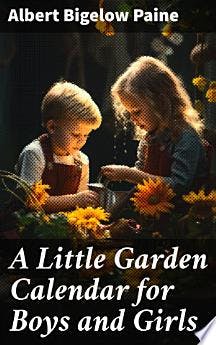- Published on
A Little Garden Calendar for Boys and Girls
- Authors

- Name
- Albert Bigelow Paine
- @search?q=Albert Bigelow Paine

Overview
"Girl's Garden" by Robert Frost is a nature poem that explores themes of innocence, the joy of gardening, and the simple pleasures of rural life.
Themes and Analysis
- Simplicity vs. Complexity: Frost's deceptively simple diction masks deeper meanings, reflecting the simplicity of rural life and its underlying complexities.
- Childhood Innocence: The poem narrates a girl's excitement in gardening, her enthusiasm, and the whimsical approach to planting a variety of crops.
- Life Lessons: The father’s role in offering the garden plot and encouraging self-reliance symbolizes imparting life lessons about hard work and dedication.
- Perception of Life: The garden represents the girl's perception of life, filled with variety and a lack of perfection, highlighting the innocence and scattered focus of childhood.
- Rural Community Life: Frost depicts village life, showcasing how people take pride in simple things and live uncomplicated, straightforward lives.
Imagery and Style
- Frost uses vivid imagery like the walled-off plot, the girl wheeling dung, and begging seeds to sprout, to transport readers into the rural setting.
- The poem’s tone evolves, illustrating the transformation from childhood innocence to a more mature understanding of life and community.
Conclusion
Frost's "Girl's Garden" is not just about gardening but a metaphorical exploration of life’s journey, emphasizing simplicity, growth, and the beauty of living a simple, unadorned life.
